|
|
|
Sort Order |
|
|
|
Items / Page
|
|
|
|
|
|
|
| Srl | Item |
| 1 |
ID:
188642


|
|
|
|
|
| Summary/Abstract |
How do bureaucrat-local politician relations affect the inclusiveness of local governance in emerging democracies? This study answers the question through conducting a case study of Tunisia. The study evaluates interview data recently collected among 39 municipalities in socio-economically divergent regions with mayors, city council members, civil society members, and a governor, and examines transparency data compiled for all 350 municipalities by an independent civil society organization. The findings suggest that partisanship appointment of governors can limit the inclusiveness of local governance through perpetuating hierarchical relations with mayors at the expense of inclusive local engagement mechanisms. An analysis on the Transparency Index of municipalities within governorates with identified partisanship ties (n = 206) indicates that municipal governance becomes less transparent when a governor shares a political background similar to the ideological position of the mayor’s party. Thus, partisan appointments of bureaucrats can have implications for the inclusiveness of local governance.
|
|
|
|
|
|
|
|
|
|
|
|
|
|
|
|
| 2 |
ID:
183774


|
|
|
|
|
| Summary/Abstract |
Governments interact strategically with sovereign bond market creditors: they make choices not only about how often and how much to borrow, but also under what terms. The denomination of debt, in domestic or foreign currency, is a critical part of these terms. The “original sin” logic has long predicted that creditors have little appetite for developing-country government debt issued in domestic currency. Our novel data, including bond issues by 131 countries in 240,000 primary market transactions between 1990 and 2016, suggest otherwise. Domestic-denominated bonds have come to dominate the market, although domestic-currency issuance often is accompanied by shorter bond maturities. We argue that ideologically rooted policy preferences play an important role in this unexpected trend in denomination. All else equal, right governments choose foreign denomination as a means of mitigating currency risk and thus minimizing borrowing costs. In contrast, left governments opt for the flexibility of domestic denomination, and they are better able to act on their preferences in the presence of risk-mitigating monetary institutions and macroeconomic stability. We find support for our argument that partisanship has a robust and enduring relationship with denomination outcomes, even in a marketplace in which domestic-denominated developing-country sovereign bonds have become the norm.
|
|
|
|
|
|
|
|
|
|
|
|
|
|
|
|
| 3 |
ID:
120137


|
|
|
|
|
| Publication |
2013.
|
| Summary/Abstract |
Compulsory rules are known to have far-reaching effects beyond boosting electoral participation rates. This article examines the relationship between compulsory voting and partisan attachments. A theory of attachment formation and strength is engaged that argues that compulsory voting boosts the likelihood that one will identify with a party and, in turn, the strength of party attachments among identifiers. The statistical model accounts for both the hierarchical structure of the data (individuals in elections) and the dual nature of the dependent variable (individuals report a strength of attachment only for the party with which they identify). Using data from the Comparative Study of Electoral Systems, it is demonstrated that compulsory voting does indeed increase both the incidence and the strength of partisanship.
|
|
|
|
|
|
|
|
|
|
|
|
|
|
|
|
| 4 |
ID:
172532


|
|
|
|
|
| Summary/Abstract |
Is support for democracy in the United States robust enough to deter undemocratic behavior by elected politicians? We develop a model of the public as a democratic check and evaluate it using two empirical strategies: an original, nationally representative candidate-choice experiment in which some politicians take positions that violate key democratic principles, and a natural experiment that occurred during Montana’s 2017 special election for the U.S. House. Our research design allows us to infer Americans’ willingness to trade-off democratic principles for other valid but potentially conflicting considerations such as political ideology, partisan loyalty, and policy preferences. We find the U.S. public’s viability as a democratic check to be strikingly limited: only a small fraction of Americans prioritize democratic principles in their electoral choices, and their tendency to do so is decreasing in several measures of polarization, including the strength of partisanship, policy extremism, and candidate platform divergence. Our findings echo classic arguments about the importance of political moderation and cross-cutting cleavages for democratic stability and highlight the dangers that polarization represents for democracy.
|
|
|
|
|
|
|
|
|
|
|
|
|
|
|
|
| 5 |
ID:
107446
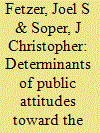

|
|
|
|
|
| Publication |
2011.
|
| Summary/Abstract |
This article investigates the current attitudes of the Taiwanese public toward
the rights of aborigines (Yuanzhumin), a neglected topic both in Taiwan and
throughout the world. The theoretical literature on ethnic politics suggests that
such attitudes might be rooted in one's level of education, ethnic group conflict
and partisanship, intergroup contact, and/or religion-like ideology (Confucian
values). Using data from the 2006 Taiwan Social Image Survey I and our 2009
privately commissioned poll on support for the rights of Taiwanese aborigines,
we test these four theories and find that higher education increases support
for aboriginal rights. The results confirm the ethno-partisanship model for
2006 but not for 2009. Conversely, the percentage of Yuanzhumin living in
a region boosted hostility toward them in 2009 but not in 2006. We likewise
discover that two Confucian values (family loyalty and social hierarchies)
have no statistically significant effect on attitudes toward Yuanzhumin. A
third key Confucian value, social harmony, appears to increase support for
aboriginal rights. Surprisingly, Confucian values seem to pose no hindrance
to the advancement of ethnic minorities' rights and may, in fact, even promote
them.
|
|
|
|
|
|
|
|
|
|
|
|
|
|
|
|
| 6 |
ID:
131001
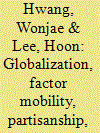

|
|
|
|
|
| Publication |
2014.
|
| Summary/Abstract |
This paper examines the relationship between economic globalization, factor mobility, government partisanship, and the relative budgetary salience of two different instruments of compensation policies: social welfare spending and industrial subsidy provision. While welfare spending directly benefits labor, industrial subsidies benefit both capital owners and labor along the sectoral line. Based on both factoral and sectoral models of trade, we theoretically argue and empirically show that governments are more likely to use welfare politics as compensation policies if free trade generates class-based interests in the society, and subsidy politics if trade openness promotes industry-based interests. We also argue that the interactions of the three variables are contingent on government partisanship. When non-class-based interests are salient as a consequence of trade openness, left-wing governments are likely to focus on welfare politics while right-wing governments favor provision of subsidies. However, when class-based interests are salient, even right-wing governments behave similarly to left-wing governments, favoring welfare spending over subsidies as the key compensation policy. In the analysis of compensation policies in the OECD countries between 1980 and 2001, the test results confirm our expectation
|
|
|
|
|
|
|
|
|
|
|
|
|
|
|
|
| 7 |
ID:
093089
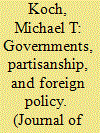

|
|
|
|
|
| Publication |
2009.
|
| Summary/Abstract |
Do variations in partisanship and political outcomes among democratic states affect the duration of militarized interstate disputes? To answer this question, the author develops a model of partisan competition derived from the government failure literature. The author argues factors associated with government failure determine the ability of governments to contend with the domestic political costs of militarized disputes, specifically the duration of those disputes. The author tests his expectations using hazard analysis on a dataset of 20 democratic governments and militarized disputes between 1945 and 1992. The results suggest the outcome of party competition in the form of a government's sensitivity to the potential political costs of conflict is an important part of the conflict process. The author concludes that differences in domestic political outcomes influence the duration of militarized interstate disputes. Governments that are politically more secure in their tenure engage in longer disputes. Alternatively, governments that are more vulnerable have significantly shorter disputes. In addition, because government partisanship contributes to vulnerability, it also affects dispute duration, with governments of the left engaging in shorter disputes, while governments of the right fight longer disputes.
|
|
|
|
|
|
|
|
|
|
|
|
|
|
|
|
| 8 |
ID:
162314
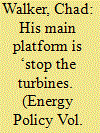

|
|
|
|
|
| Summary/Abstract |
Decades after wind energy has taken hold in many developed countries, social scientists are beginning to understand the complex story of what causes differentiated responses to local development. Transitions in this literature include moving from attitudinal factors, and the infamous Not in My Backyard (NIMBY) explanation, toward place attachment, environmental justice, and how policy development might shape support for wind turbines in rural communities. While this research has advanced our understanding of some of the major questions in this area, the political arena has largely remained implicit or in the background, rather than a specific area of detailed inquiry. Addressing this gap in the literature, we detail findings from our mixed method study of interviews (n = 54) and surveys (n = 240) with local residents, developers, and other stakeholders in Ontario and Nova Scotia, Canada. We focus on the interplay of partisanship and geography, and how together they can powerfully influence attitudes toward wind energy. Specifically, we extend the existing literature and argue that when parties politicize the issue of wind energy — especially within the context of an urban/rural divide — it becomes intertwined with elements of ideology which can amplify responses and further entrench local conflict.
|
|
|
|
|
|
|
|
|
|
|
|
|
|
|
|
| 9 |
ID:
192850


|
|
|
|
|
| Summary/Abstract |
How does Russia’s invasion of Ukraine affect Taiwanese perceptions about their own defense? Despite frequent comparisons of the war in Ukraine with a potential invasion of Taiwan, existing analyses do not directly measure Taiwanese public perceptions of a linkage. Using survey data from the Taiwan Institute for Governance and Communication Research, we identify not only the extent of concern about the war but also how this corresponds to worries about a Chinese invasion, confidence in Taiwan’s ability to win such a war, and belief about US defensive commitments to Taiwan.
|
|
|
|
|
|
|
|
|
|
|
|
|
|
|
|
| 10 |
ID:
170995


|
|
|
|
|
| Summary/Abstract |
Indonesia is a country of significant inequalities, but we know little about how Indonesians feel about the gap between rich and poor. Comparative research suggests that negative perceptions of inequality can erode public support for democratic institutions. Using survey data, we explore the relationship between inequality and support for democracy in Indonesia. We find Indonesians are divided in their beliefs about income distribution. But this variation is not determined by actual levels of inequality around the country, nor by people's own economic situation; instead, political preferences and partisan biases are what matter most. Beliefs about inequality in Indonesia have become increasingly partisan over the course of the Jokowi presidency: supporters of the political opposition are far more likely to view the income gap as unfair, while supporters of the incumbent president tend to disagree—but they disagree much more when prompted by partisan cues. We also find that Indonesians who believe socio-economic inequality is unjust are more likely to hold negative attitudes toward democracy. We trace both trends back to populist campaigns and the increasingly polarized ideological competition that marked the country's recent elections. The shift toward more partisan politics in contemporary Indonesia has, we argue, consequences for how voters perceive inequality and how they feel about the democratic status quo.
|
|
|
|
|
|
|
|
|
|
|
|
|
|
|
|
| 11 |
ID:
159757


|
|
|
|
|
| Summary/Abstract |
Fenno’s Paradox—the preference for one’s own legislator while disliking the legislature as a whole—remains one of the most consistent findings in American politics. This tendency increases the likelihood for incumbents to win reelection, despite being a part of a less popular institution. Little analysis looks at whether Fenno’s Paradox exists outside of the US in other legislative contexts, or whether incumbency itself or partisan identification is the larger influence. Using 2012 survey data from Taiwan, a mixed member system, this analysis examines individual level divergence between preference for a legislator and institutional preference. Consistent with work in American politics, we find a marginal incumbency advantage, but this effect is attenuated by the partisanship of the district legislator.
|
|
|
|
|
|
|
|
|
|
|
|
|
|
|
|
| 12 |
ID:
087045
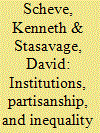

|
|
|
|
|
| Publication |
2009.
|
| Summary/Abstract |
It has been widely suggested by political scientists and economists, based on empirical evidence for the period since 1970, that the institution of centralized wage bargaining and the presence of a government of the left are associated with lower levels of income inequality. The authors make use of new data on top income shares as well as long-run series on wage inequality to examine the effects of partisanship and wage bargaining over a much longer time period, nearly the entire twentieth century. Their empirical results provide little support for the idea that either of these two factors is correlated with income inequality over this period. They then show that a closer look at the introduction of centralized wage bargaining in individual countries during the middle part of the twentieth century reveals that in countries that moved to centralize wage bargaining, income inequality had already been trending downward well before the institutional change, that the move to centralized bargaining did not alter this trend, and that these changes in income inequality were also observed in countries that did not adopt centralized wage bargaining at this time. The results suggest that there were alternative institutional paths to reduced income inequality during most of the twentieth century. This raises the possibility that either structural economic changes or commonly shared economic and political events, such as world wars and economic crises, may ultimately be more important for understanding the evolution of income inequality than are the institutional or partisan characteristics commonly considered to be decisive by political scientists.
|
|
|
|
|
|
|
|
|
|
|
|
|
|
|
|
| 13 |
ID:
151017
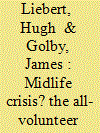

|
|
|
|
|
| Summary/Abstract |
Owing to regional and partisan imbalances, the U.S. military is at greater risk than at any time since the advent of the all-volunteer force of becoming estranged from significant portions of the society it serves. What—if anything—should be done? This article takes three initial steps to address this problem. First, the article examines regional and partisan representation in the U.S. military and suggests that existing imbalances are likely to grow worse over time. The article then argues that the most obvious policy response, a renewed draft, would in fact fail to adequately bridge the gap. Finally, the article outlines one policy response—the reassertion of nonpartisan norms—that would help to mitigate, though not close, the gap.
|
|
|
|
|
|
|
|
|
|
|
|
|
|
|
|
| 14 |
ID:
187554


|
|
|
|
|
| Summary/Abstract |
How does partisan identification shape the attitudes of US military officers toward the protection of civilians in war? Drawing on unique cross-cohort surveys of soon-to-be commissioned officers in 12 Army Reserve Officers’ Training Corps (ROTC) training battalions, we find that Democratic-leaning cadets generally prioritize norms of civilian protection more than Republican-leaning cadets when confronted with competing values of military advantage and force protection as part of a ‘combatant’s trilemma’. This gap remains partially resilient after sustained exposure to military training and socialization, including in the norms of restraint embodied by principles of combat ethics and the law of war. We attribute these partisan differences to insights from Moral Foundations Theory (MFT), which suggests that the moral values of Democrats and Republicans guide their views toward the individual use of force in combat. Our findings have important implications for comprehending the impact of political ideology and military training and socialization on attitudes regarding restraint toward civilians in war. Given the widely recognized conservative composition of the US military’s membership, these findings may help to further inform understanding of US military operations and the underlying causes of US adherence to – or violation of – the laws of armed conflict.
|
|
|
|
|
|
|
|
|
|
|
|
|
|
|
|
| 15 |
ID:
085431


|
|
|
|
|
| Publication |
2008.
|
| Summary/Abstract |
Since 1986, Taiwan has entered an era of party competition and witnessed the flourishing of political parties in terms of the number of parties and their relative strength. We find that the vacillation in the proportion of nonpartisanship is remarkable before and after the relinquishing of KMT dominance in 2000. We argue that partisans may conceal their party attachment if their parties fail to live up to their expectations. The experience of the changing Taiwanese electorate has theoretical implications for other consolidating democracies, especially the eastern European countries that also had one single dominant party before regime change.
|
|
|
|
|
|
|
|
|
|
|
|
|
|
|
|
| 16 |
ID:
178348


|
|
|
|
|
| Summary/Abstract |
Endorsements by retired flag and general officers are now a fixture of the presidential election cycle. However, their motivations are unclear. Retired flag officers might endorse with material, purposive, or solidarity motives. We evaluate these motivations with a new data set of 1,340 endorsements by 1,041 endorsers between 2004 and 2016 matched with campaign contributions. We find that campaign contributions, service in the Navy, and retiring as a higher ranked officer are all associated with an increased likelihood of endorsing. We conclude that about 10 retired flag officers participate to improve their material situation, 193 seek to advance their ideological preferences, and the remainder participate to demonstrate solidarity with their peers or acquaintances. These findings provide new insight into endorser motivations and civil–military relations.
|
|
|
|
|
|
|
|
|
|
|
|
|
|
|
|
| 17 |
ID:
165549


|
|
|
|
|
| Summary/Abstract |
Members of the public are often left choosing between two extreme candidates who will not represent the moderate, aggregate, public effectively. Cross-pressured members of the U.S. Congress serve a constituency that votes for the opposite party at the national level. If there is any group of representatives that have an incentive to moderate their voting behavior, it is cross-pressured members. In this article, I show that cross-pressured members are more moderate than the average member of their party. This could provide constraints on rampant partisanship in the form of districts that are comfortable electing a representative of one party and voting for the president of the other. However, I show that these members are significantly less likely to be reelected. Thus a paradox exists in which cross-pressured members who moderate their voting behavior are no more likely to be rewarded for behaving the way citizens claim they want to represent.
|
|
|
|
|
|
|
|
|
|
|
|
|
|
|
|
| 18 |
ID:
165022
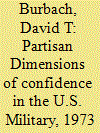

|
|
|
|
|
| Summary/Abstract |
Americans express more confidence in their military than any other institution. The components and causes of confidence have been little studied, especially as a partisan phenomenon. This study assesses trends in how partisanship and ideology affect confidence in the military. Multivariate analysis of General Social Survey and Harris Poll data shows that while confidence has increased for all demographic and political subgroups, partisanship and ideology play larger roles than commonly recognized. Democrats and Republicans are more confident than independents, but Republican confidence increased sharply over the last 20 years. Party ID is now the best predictor of one's confidence in the military. Conservative ideology has little effect, but liberalism reduces confidence, splitting Democrats. The pattern is not only “Republicanization,” however; partisans on both sides are more confident when their party holds the White House.
|
|
|
|
|
|
|
|
|
|
|
|
|
|
|
|
| 19 |
ID:
078408
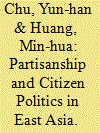

|
|
|
|
|
| Publication |
2007.
|
| Summary/Abstract |
This article assesses the relative importance of partisanship in explaining level of citizens' political engagement within a multivariate framework. In particular, we examine if the relative worth of partisan attachment in explaining civic engagement differs systematically between East Asian emerging democracies and that of the established democracies. We find that partisanship in East Asia exerts just as much influence on citizens' engagement in politics as in established democracies. The global trend in which interest associations and social movements are becoming vigorous competitors to parties for the opportunity to represent and mobilize citizens in democratic process has also spread to East Asia.
|
|
|
|
|
|
|
|
|
|
|
|
|
|
|
|
| 20 |
ID:
078409


|
|
|
|
|
| Summary/Abstract |
How do attachments to political parties among the mass publics of East Asia affect the process of democratization in the region? Analyses of the East Asia Barometer surveys reveal that partisanship motivates East Asians to endorse the democratic performance of their political system and embrace democracy as the best possible system of government. These findings accord, by and large, with the socialization, cognitive dissonance, and rational choice theories of partisanship
|
|
|
|
|
|
|
|
|
|
|
|
|
|
|
|
|
|
|
|
|